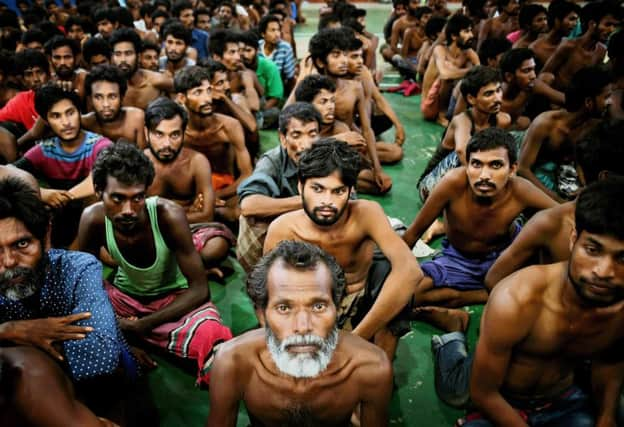Fears grow for migrants trapped in boats


With food and clean water running low, agencies fear many could be in grave danger.
Worried that vessels will start washing to shore with dead bodies, the UN High Commissioner for Refugees, the United States and several other foreign governments and international organisations held emergency meetings in recent days, but participants say there are no immediate plans to search for vessels in the busy Malacca Strait waterways.
Advertisement
Hide AdAdvertisement
Hide AdOne of the problems was determining what to do with the Rohingya if a rescue was launched, officials said. Seven boats were rescued on Sunday after human traffickers abandoned the ships and left passengers to fend for themselves. Nearly 600 migrants were brought to shore in western Indonesia and just over a thousand to Malaysia’s Langkawi island.
Denied citizenship in Myanmar, the Rohingya are effectively stateless.
“At this point, I’m not sure what the next steps are or should be,” said Vivian Tan, the UNHCR’s regional press officer in Bangkok. “There is a real sense of urgency, but there doesn’t seem to be a clear mechanism in this region for responding to something like this.”
Moreover, she said, the location of the boats and the number of people on board needed to be clarified.
Some weak and hungry survivors waded to shore while others swam.
The Rohingya, who are Muslim, have for decades suffered from state-sanctioned discrimination in Buddhist-majority Myanmar, which considers them to be illegal settlers from Bangladesh even though many of their families arrived generations ago.
Attacks on members of the religious minority, numbering at around 1.3 million, have in the last three years left up to 280 people dead and forced 140,000 others from their homes. They now live under apartheid-like conditions in crowded camps just outside the Rakhine state capital, Sittwe, where they have little access to school or adequate health care.
The conditions at home – and lack of job opportunities – have sparked one of the biggest exoduses of boat people since the Vietnam War.
Advertisement
Hide AdAdvertisement
Hide AdChris Lewa, director of the non-profit Arakan Project, which has been monitoring boat departures and arrivals for more than a decade, estimates more than 100,000 men, women and children have boarded ships since mid-2012.
Most are trying to reach Malaysia, but recent regional crackdowns on human trafficking networks have sent brokers and agents into hiding, making it impossible for migrants to disembark – in some cases even after family members have paid $2,000 or more for their release, she said.
Lewa believes up to 7,000 Rohingya and Bangaldeshis are still on small and large boats in the Malacca Strait and nearby international waters, some after more than two months at sea. “I am very concerned about smugglers abandoning boatloads at sea,” she said.